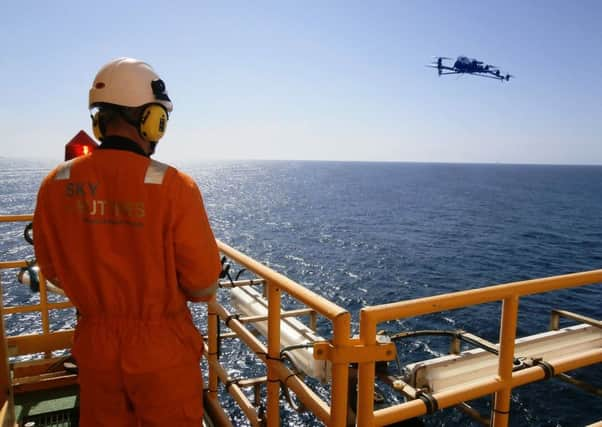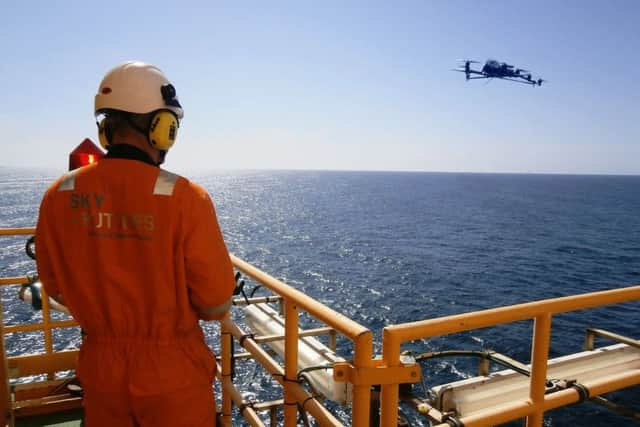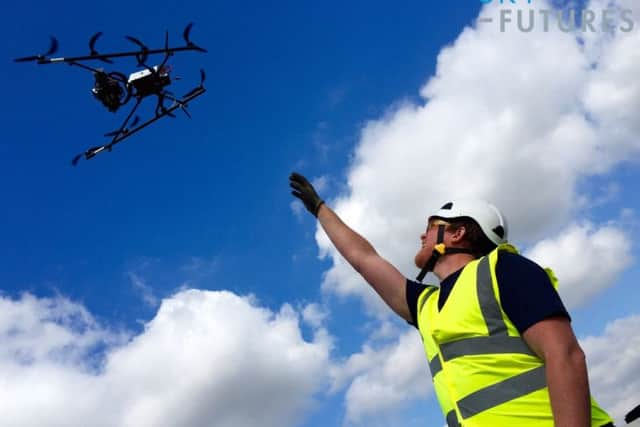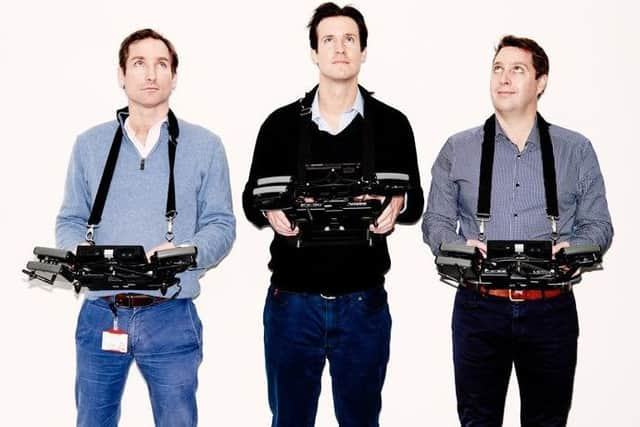Video: '˜Game changing' drone technology to revolutionise North Sea industry


As former military men, they flew drones over Iraq and Afghanistan to collect high-quality data about the world’s most hostile environments.
Now for James Harrison and his partner Chris Blackford, applying those same principles to the inhospitable North Sea seemed like a logical step.
Advertisement
Hide AdAdvertisement
Hide AdIn combat zones, the drones built up a detailed analysis of areas previously not ventured to give the best information to troops before sending them on the ground.


In the North Sea, the drones are dispatched from platforms to collect data on the security and safety of rigs and reduce the need to send workers into high-risk working areas.
The drones can pick up defects on the ageing platforms down to the millimetre with developing technology that allows the Unmanned Aerial Vehicles (UAVs) to search for leaking gas.
Ms Harrison, 34, former Captain with the Grenadier Guards, said the drones were able to venture into areas previously inaccessible while the platform was still in production - such as the burning flare tip.


This helped to improve efficiency and make “massive savings” by avoiding lengthy platform shutdowns for maintenance checks, he said.
Mr Harrison, co-founder and chief executive of Sky-Futures which has a base in Aberdeen, said: “The way we look at it, the drones are not replacing people. They do things that people can’t do.
He added: “Both myself and Chris were using drones in Iraq and Afghanistan where we were getting data from areas we had never gone into before.
“We were using that data in a really different manner to see if there were any changes in behaviour on the ground.


Advertisement
Hide AdAdvertisement
Hide Ad“That really gave us this idea to use the drones in industry and use them instead of having people on the ground - or before you put them on the ground - in these dangerous environments.
“What we were doing in Afghanistan is essentially no different to what we are now doing in oil and gas.”
The work of Sky-Futures - which has a third co-founder Nick Rogers, an airline captain- is considered part of the “game changing” movement of innovation that will help the industry manage lower costs and keep production running during one of its most challenging eras.


A conference in Aberdeen next month is to showcase the technology that will create new efficiencies in the face of low barrel prices, the decommissioning of ageing installations and high costs of new exploration.
Mr Harrison said: “Recently we inspected a flare tip while the platform was still in production and found significant damage. With our in-house engineers we were able to work out how it could be fixed and get the required parts in place ahead of shutdown. That really is a massive saving to a company.
“Quite often, companies will use helicopters for an inspection with a photographer hanging out of the side. That in itself is fairly dangerous and normally you would have a rope access technician and a support vessel on standby.
“One company had a helicopter out two weeks before we were on platform doing an inspection of the outside of the rig.
“When we used the drone we were able to identify a pretty significant crack which, due the angle of the helicopter, they would never have seen.
Advertisement
Hide AdAdvertisement
Hide Ad“For every five days we are gathering data on an oil and gas platform we can do the same amount of work that a rope access team will take eight weeks to complete.”


He said that data collected by drone could be handed to a rope access team to make their inspections more efficient - and reduce the risks of being on the job.
Around £1m had been invested in tech development at Sky-Futures within the last year with a greater sum due for 2016.
Bristow Helicopters announced this month that it is to invest almost £3m in the firm, with the creation of five new jobs.
Mr Harrison said; “We want to work with operators to understand in-depth what their problems and we want Aberdeen to be leading the way with new ideas.
“We were the first company to do an offshore inspection using drones in the Gulf of Mexico and we are exporting this knowledge straight out of Aberdeen.
“We are excited to help operators to solve the big problems they are facing so we can help keep platforms producing, keep oil and gas running - and ultimately help keep people in their jobs.”
Dr Patrick O’Brien, CEO of the Industry Technology Facilitator (ITF), which will host the technology showcase in Aberdeen on March 9, said fresh innovation was helping the industry adapt to new realities.
Advertisement
Hide AdAdvertisement
Hide AdHe said: “Developing new technologies that address crucial North Sea efficiency challenges is a priority for the oil and gas industry as it adapts to the realities of a low cost environment.
“Unmanned aircraft can now carry out offshore inspection activities more cost effectively and with less risk and their potential is growing as the technology becomes increasingly robust.
“Asset integrity and finding new solutions to support older platforms keep production flowing is a priority theme at this year’s Technology Showcase where we’re bringing innovators together with industry players to seek out potential game-changers.”